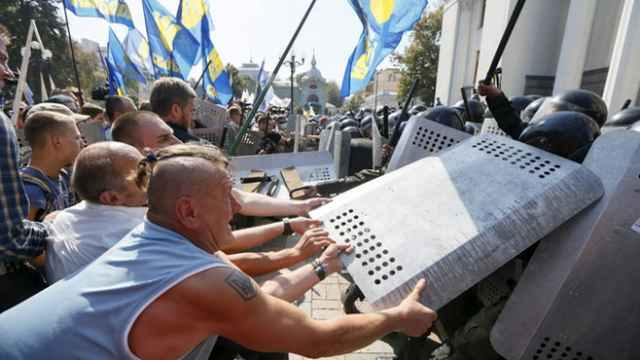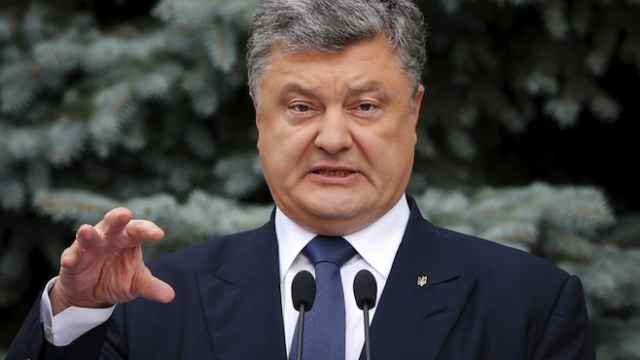Ukraine still faces the threat of a full-scale Russian military attack despite several days of relative calm on the front-lines of the east where government forces confront Russian-backed separatists, President Petro Poroshenko said on Tuesday.
Poroshenko's comments at a government meeting come amid signs of discord in the governing coalition over his peace efforts and disenchantment over falling living standards and economic hardship.
Russia's aim is to "strangle our state economically and destabilize it," he said, referring to a Russian ban on Ukrainian food imports and a failure to agree on a new price structure for Russian gas imports which has left Ukraine's storage levels dangerously low as winter approaches.
Moscow is also now insisting Kiev repays a $3 billion bond in full in December, disassociating itself from an agreement by other Ukraine creditors to ease repayment conditions on its huge foreign commercial debt.
But turning to a tenuous ceasefire in the separatist-minded east since February and a fall-off in shelling and shooting in the past few days, he said: "I am sure that a full-scale renewal of offensive activity by Russia represents the main threat."
His words echoed a proposed new military doctrine which defines Russia as Ukraine's military adversary and abandons Ukraine's unaligned status in favor of Euro-Atlantic integration, a reference to NATO membership.
Earlier on Tuesday, the UN Human Rights Office significantly revised up its estimate for casualties from the conflict, saying that at least 7,962 people had been killed and 17,811 wounded since April 2014 when separatists in the east rebelled against a new pro-Western government in Kiev.
Kiev and the West say Russia has sent arms and soldiers to fight for the separatists, though Moscow denies this.
Separately, a military spokesman said on Tuesday that one Ukrainian soldier had been killed and two wounded in military action in the past 24 hours.
Poroshenko is sticking by a peace agreement, reached in Minsk, Belarus, in February by himself and the leaders of Russia, Germany and France.
But his plans to grant greater self-governing rights to rebel-held regions sparked street violence on Aug. 31 in which three national guardsmen were killed and the pro-Western coalition supporting him in parliament showed signs of fraying.
With local elections due on Oct. 25, Poroshenko's popularity appears to be dipping, according to a survey by Kiev's International Institute of Sociology which showed that 27 percent of people would vote for him against 35 percent in March.
Phased rises in the price of household gas and electricity this year, at the urging of the International Monetary Fund, have driven up consumer price inflation which was more than 52 percent in August year-on-year.
With an eye to the October poll, Poroshenko said he accepted that planned increases of between 12-18 percent in public sector salaries, pensions and welfare payments did not cover the hardship suffered by many. "I won't even begin to try to hide this," he said.
A Message from The Moscow Times:
Dear readers,
We are facing unprecedented challenges. Russia's Prosecutor General's Office has designated The Moscow Times as an "undesirable" organization, criminalizing our work and putting our staff at risk of prosecution. This follows our earlier unjust labeling as a "foreign agent."
These actions are direct attempts to silence independent journalism in Russia. The authorities claim our work "discredits the decisions of the Russian leadership." We see things differently: we strive to provide accurate, unbiased reporting on Russia.
We, the journalists of The Moscow Times, refuse to be silenced. But to continue our work, we need your help.
Your support, no matter how small, makes a world of difference. If you can, please support us monthly starting from just $2. It's quick to set up, and every contribution makes a significant impact.
By supporting The Moscow Times, you're defending open, independent journalism in the face of repression. Thank you for standing with us.
Remind me later.





